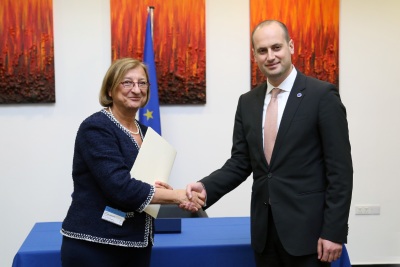Georgia Ratifies the Istanbul Convention
Date:
Today Mr. Mikheil Janelidze, Minister of Foreign Affairs of Georgia deposited the instrument of ratification in respect of the Council of Europe Convention on preventing and combating violence against women and domestic violence.

Mikheil Janelidze, Minister of Foreign Affairs of Georgia deposited the instrument of ratification in respect of the Council of Europe Convention to Gabriella Battaini-Dragoni, Deputy Secretary General of the Council of Europe; Photo: The Ministry of Foreign Affairs of Georgia
Ms. Erika Kvapilova UN Women Country Representative made the following statement: Violence against women and girls is one of the most pervasive human rights violations, and it is an extreme manifestation of gender inequality and systemic gender based discrimination. Ratification of the Istanbul Convention will substantially galvanize efforts directed at combating violence against women and girls in Georgia. In addition, it will enhance impetus to strengthen a holistic national framework to prevent it. The process is also instrumental to achieving targets under Georgia’s nationalized Sustainable Development Goal 5.
The Istanbul Convention of the Council of Europe is the most comprehensive international treaty on combating violence against women and domestic violence. The Convention was presented in 2011 and entered into force in August 2014.
The Istanbul Convention recognizes violence against women as a human rights violation. The Convention requires states parties to promote and effectively implement policies of equality between women and men and the empowerment of women; to protect women against all forms of violence; and to prevent, prosecute and eliminate violence against women and domestic violence. To offer a holistic response to violence against women and domestic violence, it calls for the involvement of all relevant actors, such as government agencies; the national, regional and local parliaments and authorities; national human rights institutions; and civil society organizations.